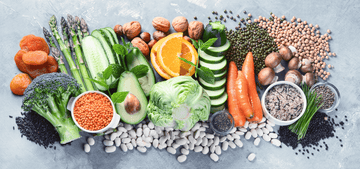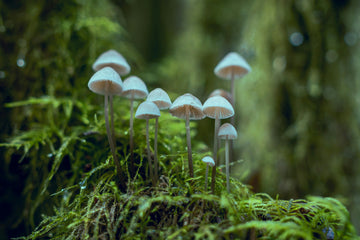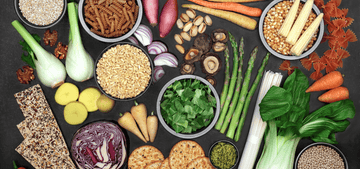Are Plants Trying to Kill Us? The Truth About Lectins, Phytates, and Oxalates
Let's first discuss dietary Plant lectins. The lectins that we actually eat. Plant Lectins help our bodies defend against Cancer cells so effectively, researchers are looking for ways to use them in Cancer therapy as drugs. Of course, eating more plant foods that contain plant lectins may help as well.
Lectins inhibit cancer cells mostly via helping prevent cancer cell creation (autophagy), inhibiting cancer cell growth (proliferation), and initiating cancer cell destruction (apoptosis).
How did they do this?
Here are the researchers have found: Study: Plant-Derived Lectins as Potential Cancer Therapeutics and Diagnostic Tools "Previous reports have revealed the ability of plant lectins to bind to tumor cell surface and promote apoptotic and autophagic (cancer) cell death"
Study: Plant lectin-induced apoptosis in cancer cells: a mini-review
"One mechanism of eradicating cancer cells is by triggering apoptosis. Plant lectins have been shown to induce apoptosis in various types of cancer cells. Plant lectins use different mechanisms of apoptosis, but typically induce similar morphological changes such as DNA fragmentation and chromatin condensation. Increasing our understanding of the plant lectins apoptotic pathways is crucial in developing drugs that can inhibit the proliferation of cancer cells. This paper aims to provide a general perspective for understanding lectin's potential role as novel anti-cancer drugs."
Study: Lectins as Bioactive Plant Proteins: A Potential in Cancer Treatment
"Plant lectins, a unique group of proteins and glycoproteins with potent biological activity, occur in foods like wheat, corn, tomato, peanut, kidney bean, banana, pea, lentil, soybean, mushroom, rice, and potato. Thus, dietary intakes by humans can be significant. Several lectins have been found to possess anticancer properties in vitro, in vivo, and in human case studies; they are used as therapeutic agents, preferentially binding to cancer cell membranes or their receptors, causing cytotoxicity, apoptosis, and inhibition of tumor growth."
This makes me wonder why people are suggesting that we should avoid plant lectins when they are used by the body to 1) prevent the creation of cancer cells, 2) inhibit cancer cell growth and 3) actually help destroy cancer cells in our body? Yes, too much plant lectin intake like from eating raw white beans can cause digestive tract distress, but most people cook or sprout beans before consuming them, greatly reducing the lectins to normal healthy levels.We now know that lectins are so important for use against cancer, that the human body actually creates its own lectins. Now you see how important lectins are. So important that pharmaceutical companies and researchers are looking for ways to use these plant lectins to kill cancer cells in cancer treatment and therapies. Next let's discuss oxalates. What are oxalates? Oxalate or oxalic acid is something that plants use to bind the calcium when they produce excess calcium, so it does not impede their own processes. Some people have assumed that because this calcium is bound to oxalate, our body cannot liberate this calcium effectively or efficiently. We now know in a healthy human body with a healthy gut microbiome, this does not seem to be the case. How do we know this? The reason people do or don't have any oxalate issues with dark greens may have to do with whether they have a healthy gut microbiome or not. There are bacteria in a human healthy gut that are called Oxalobacter formigenes.
Oxalobacter bacteria are named because they are oxalate-eating bacteria. When we consume oxalates and fiber (whole green plant foods), they consume the oxalates and fiber to help them grow and increase in number.
“Oxalobacter formigenes degraded up to 98% of available oxalate in vitro and also promotes endogenous oxalate secretion.”
So why is this important? It's important because the Oxalobacter not only consumes the oxalates in our diet, Oxalobacter pulls oxalates out of our own body and consumes those oxalates too! This is important because our body produces oxalic acid as a waste material in normal functioning. Over half of all of the oxalates in our body are produced by our own body. Having high quality and amounts of Oxalbacter in our microbiome will actually pull oxalates out of our body and remove them, helping to prevent formation calcium/oxalate kidney stones. Now how do we know this? Several studies show that those people who have used antibiotics tend to wipe out the good Oxalbacter bacteria. And in doing so, they remove their body's ability to remove oxalates from their system. Oxalbacter feeds on plants - specifically fiber, prebiotic fiber and poly phenols all of these come from plants and only plants and we must consume a lot to feed and grow our population of Oxalbacter bacteria.
Study: Intestinal flora may prevent kidney stones
"...the intestinal bacteria Oxalobacter formigenes can prevent the development of kidney stones..."
Study: Oxalobacter formigenes may reduce the risk of calcium oxalate kidney stones
"In conclusion, these results suggest that colonization with O. formigenes is associated with a 70% reduction in the risk for being a recurrent calcium oxalate stone former."
A high fiber oxalate inclusive diet increases oxalate eating bacteria that in turns helps eliminate waste xalic acid from the body, reducing risk of kidney stones. Conversely, diet of animal protein and animal fat increases pathogenic bacteroides bacteria, which then competes and decreases the amount of good Oxalobacter bacteria in our guts. Research has show that introducing the good Oxalobacter bacteria cancels out the negative effects in just a single dose!. Quote from the study, "A single oral ingestion of O. formigenes by adult volunteers was, for the first time, shown to result in reduced urinary oxalate excretion following administration of an oxalate load..."
So this is a good thing that not only when we've eat plants, rich in oxalates, it can feed and multiply these oxalate eating bacteria. Once again, eating animal products can reduce the amount of good Oxalic factor bacteria, putting you at higher risk and so can taking antibiotics – both of which can significantly reduce the amount of good health promoting Oxalobacter Bacteria in our gut.
Study: Risk of Kidney Stones: Influence of Dietary Factors, Dietary Patterns, and Vegetarian-Vegan Diets
"Available scientific evidence agrees on the harmful effects of high meat/animal protein intake and low calcium diets, whereas high content of fruits and vegetables associated with a balanced intake of low-fat dairy products carries the lowest risk for incident kidney stones.”
Next, let's look at phytates.
What are phytates, also called phytic acid or Inositol Hexaphosphate (IP6)?
Phytate are antioxidants that are found in our diet bound to plant source iron. This used to be thought of as a bad thing (some still do), because they thought that the phytate-bound iron prevented the absorption of iron. We now know differently. Heme Iron, is an unbound iron found only in animal flesh and is not present in any plant foods. Phytate-bound iron is found only in plants - and this is a good thing! We now know that it's important for plants to bind and protect that iron from oxidizing by binding it to a powerful anti-oxidant.First they thought the much greater absorption of Heme Iron made animal sourced iron better – it turns out, that actually made it worse! Too much iron absorbs to the point our body blocks it from being absorbed!
November 2021 Study: "British Society of Gastroenterology guidelines for the management of iron deficiency anemia in adults"
“One of the interesting developments of the last few years is that we have been giving people too much iron; the problem is that it causes side effects,”
“…oral doses of 60mg iron stimulate hepcidin levels for the next 24 hours, thus reducing subsequent iron absorption by 35-45%.”
“…a daily dose of 15mg of iron was as effective as 50 or 150mg in terms of hemoglobin response, with a lower incidence of adverse effects.”
What this study is suggesting is that plants had it all right all along. Animal Heme iron is free iron that can pass into the gut into the bloodstream super rapidly. This is actually a bad thing. Because the body responds by saying whoa, that's too much iron. Then the liver reduces produces hepcidin to block the absorption of iron for the next 24 hours. Reducing the absorption by almost half.Now when that blocked iron remains in the gut and can accumulate in the colon. Meal after meal of eating animal proteins produces more and more heme iron that is not getting into our bloodstream and is instead staying in our digestive tract. Well what is iron? Iron is a metal. What happens to iron when you get it wet? It rusts - that's called oxidation. Iron oxidation becomes caustic and can cause cancer as stated in many studies – we even know the exact pathways that Heme Iron cause cancer:
Study: Heme iron from meat and risk of colorectal cancer: a meta-analysis and a review of the mechanisms involved
“…heme iron has a catalytic effect on (1) the endogenous formation of carcinogenic N-nitroso compounds and (2) the formation of cytotoxic and genotoxic aldehydes by lipoperoxidation. …both pathways are involved in heme iron toxicity.”
Colorectal cancer is the #2 Cancer Killer of humans in the United States. Heme Iron is both cytotoxic - meaning it destroys cells, and Genotoxic which it means it destroys or damages the DNA. What happens when you damage DNA? If the DNA is damaged it is going to start reproducing bad copies of bad cells. This is cancer. That is what a cancer cell is - a normal healthy cell that has been damaged and starts producing bad copies of itself. So, we know Heme iron can cause cancer. We know exactly how it causes cancer. We know that heme iron is not better because it absorbs more effectively than plant-based iron. It is worse because it's too absorptive forcing the body to repel the iron and building up iron in the colon, causing cancer. Plant sourced iron, on the other hand, does just the opposite. This phytate bound iron is an antioxidant bound to the iron that protects the iron from oxidizing. This keeps the iron from oxidizing and becoming carcinogenic or destructive to cells and the cells’ DNA. If that weren't good enough, studies have shown that once our body needs that iron, our microbiome will separate the phytate from the iron to release the iron in the exact amounts the body needs. Otherwise, it'll keep it bound and remove it from the body, through waste elimination to keep our body safe and protected from oxidized iron.
If that wasn't cool enough, once that phytate is broken off, studies have shown that phytate protects cells from forming cancer, prevents cancer cells growth and can even kill cancer cells. And if the cancer cells aren't damaged too much can be absorbed by the cell and reverse a cancer cell back to a healthy normal cell! That's right reversing cancer cells. That's what plant based phytate-bound iron can do for you. So once again, we see that plants that were accused of being “bad” because they had Lectins, Oxalates and Phytates are actually GOOD because they're preventing kidney stones. They're preventing oxidation of iron in our guts. They can prevent, kill and even reverse certain cancers. These three Phyto-actives are awesome!





